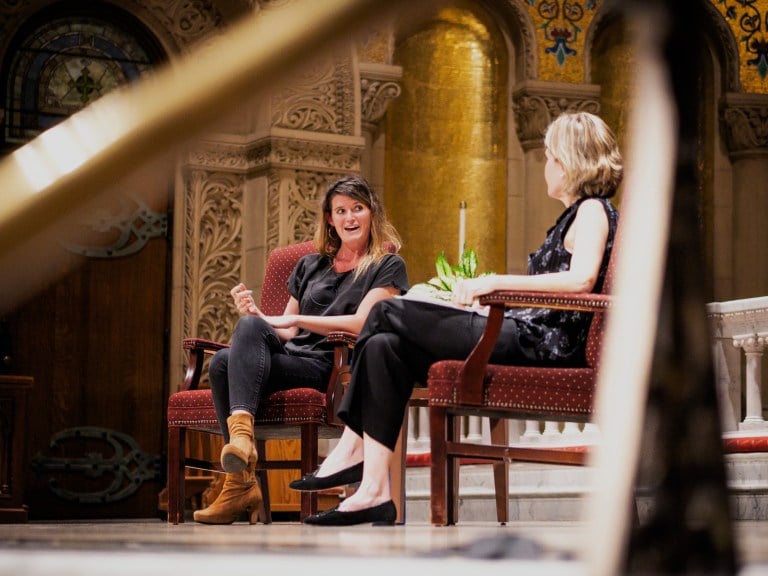“Scientists have discovered that employing positive allusions will help you to achieve your goals, but I have slowly come to believe that far better things await outside of the tunnel vision of your goals,” writes Lulu Miller in “Why Fish Don’t Exist.”
Drawing from her own experiences from her journalistic career, Miller shared her own story on Tuesday with Caroline Winterer, a professor of history and American studies. The lecture was part of the Civic, Liberal and Global Education (COLLEGE) program introduced in 2021 to emphasize the diverse experiences in a liberal education.
“Why Fish Don’t Exist” was chosen as one of the novels for the Three Books program for 2022, following the theme of biodiversity. The novel incorporates parts of Miller’s personal reflections in the telling of Stanford’s founding president David Starr Jordan’s life, centering around science and ichthyology.
Miller began Tuesday’s talk with the idea of confidence (and lack thereof) in the early parts of her life. She also humored the audience by adding the irony of not getting accepted to Stanford but coming now, years later, to do a lecture. As Miller grew to write better, her confidence blossomed.
“Writing is a lifelong journey. The human mind compared to all of planet Earth is so little. We have so little figured out, and there’s so much more than you and I,” Miller said.
Although Jordan played a founding role in Stanford’s history, he was also a leader in the eugenics movement, a foundation for forced sterilization. Because of his legacy, Stanford announced their plans to rename campus spaces that honor Jordan and relocate Agassiz’s statue.
Miller humorously provided her thoughts on the relocation and renaming as two solutions: turn the sculpture upside down to attract more student interest or have a friendly contest among Stanford students and faculty to determine which sculpture would be the best replacement.
Miller also used the natural world to talk about the importance of the breadth of education compared to the depth of education, addressing the students in the audience directly. In the COLLEGE curriculum, students are encouraged to explore unfamiliar topics and tie that into their college journeys. For example, students are given unconventional readings tied to diversity and student life; one week may focus on “Frankenstein” while another focuses on Plato’s “Allegory of the Cave.”
“Just look at nature and how it’s colored by our own subjectivity and perception. We always have to be careful and get an education to teach us to think about these things,” Miller said.
Nearing the end of the lecture, Miller played an audio clip of an interview with an autistic historian addressing the topic of whether or not disabled persons should be able to reproduce.
The historian argues that the line distinguishing the level of the intellectual disability in relation to reproduction is “awkward and it all depends on the policies, politics and who’s deciding where that is.” Speaking from personal experience, the historian shared that she recently gave birth to a child, which was the “the most amazing moment of [her] life.” This audio segment relates back to the intersection of purpose and disability, a topic Miller frequently explores in her audio storytelling career.
In terms of the inspiration behind her novel, the author cited her confidence, circling back to the ideas mentioned in the first half of the talk.
“It’s really about seeking inspiration because that’s what’s thrilling about nature. There’s so many ways to thrive and survive that we’re still figuring out,” Miller said.
Throughout the lecture, Miller engaged the audience with humor interlaced with thoughtful comments on biodiversity, the art of writing and life beyond college. As her novel primarily focuses on the life of Jordan, participants were able to gain more insight into what his life was like and the relatable features to students’ lives today, especially as freshmen on campus.
As Miller wrote, “Nowhere is the sky so blue, the grass so green, the sunshine so bright, the shade so welcome, as right here, now, today.”
